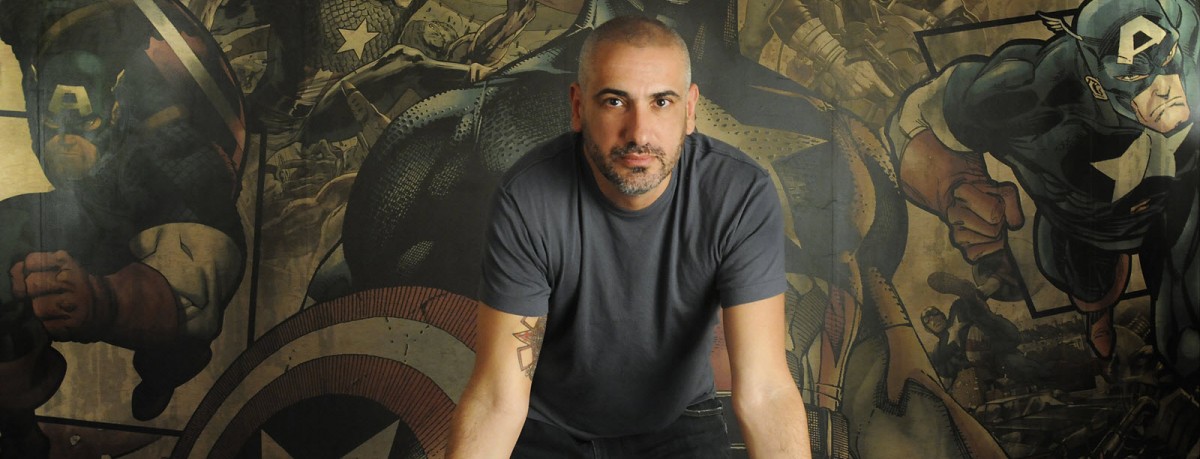Today comic book movies rule the cinematic roost — and the likes of Iron Man, Captain America, Thor and the Avengers prove we live in a Marvel universe. Yet, before our favorite Marvel avengers hit the silver screen they were birthed on the pulp pages by some pretty creative geniuses. While all of the attention was generally focused on the fictional figures, little was known about the minds or people that dream up these characters. Axel Alonso, Editor-in-Chief of Marvel Comics, is one of those geniuses and is partly responsible for the introduction of some of the new, hottest and diverse faces in comic books today. ‘LLERO caught up with the award-winning Marvel jefe to gain insight into the good, bad and ugly of the comic book game as well as the changing shades and characters of the Marvel universe.
Alonso’s Origin Story
Growing up, Alonso was a fan of comics like most of us. But, as he grew older, he put the comics away and concentrated on seemingly more important matters. It wasn’t until college that he rediscovered his penchant for comics thanks to the comic book series Love And Rockets by Los Brothers Hernandez. Making it a career however was never something Alonso imagined.
The son of a Mexican dentist and a British librarian, Alonso took a traditional path and studied sociology and politics at the University of California Santa Cruz. Afterwards, he worked a few odd jobs and stumbled into a journalism career writing for magazines and newspapers. It fortuitously led him to New York City and Columbia University’s journalism school. There he continued writing for local newspapers like Newsday and the New York Daily News mostly profiles of fascinating individuals.
While reading the The New York Times, Alonso learned about an editorial position at a DC Comics imprint and applied. “I sent them my resume and I thought, ‘There’s a snowball chance in hell that they’re going to want me,’” Alonso recalls. But then editor Lou Stathis called him in for a meeting — and this is where it gets interesting.
“When I walked in the door, [Stathis] acted like he knew me,” Alonso recalls. “He said, ‘I wanted to meet you for a while.’”
It turns out an article Alonso had written about two people on opposite ends of the marijuana debate — a D.E.A. agent and the former editor of High Times magazine — had caught Stathis’ attention. Mostly because Stathis and the former editor had recently been rivals over a mutual lady friend. Stathis kept Alonso’s article for comic relief. And, as Alonso put it: “That was that.” He got the gig.
Shortly after being hired, Alonso inherited Stathis’ position after his mentor’s untimely death. Alonso went on to oversee DC Comics from 1993 to 2000. He then moved on to Marvel Comics where he began as senior editor and ascended to his current position as Editor-In-Chief in 2011.
The Marvel World is a Changing…
Under Alonso’s watch, Marvel’s universe is beginning to reflect the various colors and people of the non-comic book world such as Miles Morales, the African-American and Puerto Rican Spider-Man. “[Miles Morales as Ultimate Comics Spider-Man] was a concept that we talked about for a while, and it was a concept that we felt was overdue.”
During a story meeting, Alonso and his writers realized that if they were willing to kill off Peter Parker they needed someone to replace him. “Then, we remembered this idea that we toyed with in the past…it was really beautiful,” he recalled.
“The notion that you could have this guy in red and blue strip back the mask and reveal a very different face — a face that would be welcoming to a whole different audience. It was [writer] Brian [Michael Bendis] that suggested, ‘Well, why stop there? Let’s reflect the larger diversity. Let’s make him Hispanic.’ And, of course, I did not object and Miles was born.”
He did not however stop with Miles. “Right now we’re in a period where we’re really showing diversity,” Alonso explained.
“We have just premiered the all-new Ghost Rider. Finally, I’ve got my Mexican-American superhero, Robbie Reyes. It’s red-hot! People love it! We made the cover of Lowrider magazine. We just debuted Kamala Khan who is the new Ms. Marvel, and she’s a Muslim girl from New Jersey. We have a variety of other characters popping up right and left of various ethnicities. We have six titles all with female leads which is unprecedented.”
Considering his non-linear beginnings, el jefe has unique advice on getting into the comic book game.
The Good
“Comics are an amazing collaborative art form that allows a really small group — two to three people, an artist, writer and an editor — to have a large amount of creative freedom and to tell stories that are available immediately to the public [outside of newspapers.]. Comics always allow you to be fresh and topical. You can always be a part of the cultural discourse, and there are fewer suits involved than if you’re making a movie, or you have an idea for a book where you have to get approval and you need to get it published. So, there’s a real immediacy to what we do.”
The Bad
“In all creative fields you are going to encounter people who embrace the notion that there is one blueprint for creative success, that there is one way of doing things. When you’re creating something whether it’s a comic book, a movie, a book or whatever, music, it’s voodoo. There are people in positions of power that believe there is one way of doing things [and there’s not].”
The Ugly
“That would be human nature. This is again not unique to comics, but people abuse power. Power corrupts. People believe their hype. It gets between them and their art. It’s not often that you see it, but when you see it, you’re always disappointed.”
Sound Advice
“Don’t assume your career path will be a straight line — especially in an arts-related field. Una — whether it’s a life experience or a work experience — is wasted. All of that contributes to your creative point of view. Everything I’ve been through has prepared me for this job. Also don’t be afraid to speak your mind or fret the consequences. I’m not saying be stupid or arrogant, but if you feel that you’ve got a good point, don’t go with the flow. Speak your mind and see where it takes you. I’ve learned that when I pushed back I learned more about myself and grown more. I respect my staffers who push back. Even if I need to write over them because I outrank them, I still respect when they force me to reassess my game.”
Images courtesy of Marvel Comics

